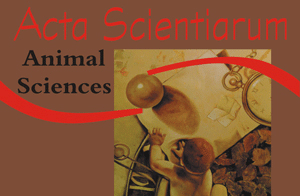| Primers |
GenBank |
Sequences |
Annealing |
Size (bp) |
Reference |
| BR38 |
KC117543 |
F’ AGTTCCTTCTCGTTCCCCTTC R’ ATCTCCCACTCTCTCTGGCTC |
62ºC |
104-146 |
Batista & Alves-Gomes (2006Batista, J. S. & Alves-Gomes, J. A. (2006). Phylogeography of Brachyplatystoma rousseauxii-(Siluriformes: Pimelodidae) in the Amazon Basin offers preliminar evidence for the first case of “homing” for an Amazonian migratory catfish. Genetics and Molecular Research, 5, 723-740. ) |
| BR47 |
KC117543 |
F’ TCAGTGTGTGTGTGACTGTTG R’ GCTCCTCTTGTTTCACTTTC |
59ºC |
136-150 |
Batista & Alves-Gomes (2006Batista, J. S. & Alves-Gomes, J. A. (2006). Phylogeography of Brachyplatystoma rousseauxii-(Siluriformes: Pimelodidae) in the Amazon Basin offers preliminar evidence for the first case of “homing” for an Amazonian migratory catfish. Genetics and Molecular Research, 5, 723-740. ) |
| BR51 |
KC117543 |
F’ GTTACACATGGTCGCTGGTG R’ GTTCATTCTCTTCGGCTTCG |
60ºC |
252-257 |
Batista & Alves-Gomes (2006Batista, J. S. & Alves-Gomes, J. A. (2006). Phylogeography of Brachyplatystoma rousseauxii-(Siluriformes: Pimelodidae) in the Amazon Basin offers preliminar evidence for the first case of “homing” for an Amazonian migratory catfish. Genetics and Molecular Research, 5, 723-740. ) |
| BR61 |
KC117543 |
F’CTGTCGAAAACATGAGGCAG R’ GACATCAGAGCGAAGCACAC |
65ºC |
268-273 |
Batista & Alves-Gomes (2006Batista, J. S. & Alves-Gomes, J. A. (2006). Phylogeography of Brachyplatystoma rousseauxii-(Siluriformes: Pimelodidae) in the Amazon Basin offers preliminar evidence for the first case of “homing” for an Amazonian migratory catfish. Genetics and Molecular Research, 5, 723-740. ) |
| PPU01 |
HQ317844 |
F’ CAGCATCAGCGGAAAAGTTG R’ CAGTGGCGCATTCTGTAATC |
58ºC |
205-212 |
Saulo-Machado et al. (2011Saulo-Machado, A. C., Formiga, K. M., Ortiz, M. F., Sousa, A. C. B., Alves-Gomes, J. A., & Batista, J. S. (2011). Polymorphic microsatellite DNA markers for the Amazonian catfish Pseudoplatystoma punctifer (Siluriformes: Pimelodidae). Conservation Genetics Resources, 3(2), 307-310. DOI: https://doi.org/10.1007/s12686-010-9349-4
https://doi.org/10.1007/s12686-010-9349-...
) |
| PPU02 |
HQ317845 |
F’ CAGAACCAGATCCAACGTCA R’CTCCCTAGACTTCCCATTTCC |
62ºC |
215-238 |
Saulo-Machado et al. (2011Saulo-Machado, A. C., Formiga, K. M., Ortiz, M. F., Sousa, A. C. B., Alves-Gomes, J. A., & Batista, J. S. (2011). Polymorphic microsatellite DNA markers for the Amazonian catfish Pseudoplatystoma punctifer (Siluriformes: Pimelodidae). Conservation Genetics Resources, 3(2), 307-310. DOI: https://doi.org/10.1007/s12686-010-9349-4
https://doi.org/10.1007/s12686-010-9349-...
) |
| BH8 |
DQ408244 |
F’ CCATGGCTCAACACAGATAT R’ TGTACGAATCCTGAAATGCT |
56ºC |
182-193 |
Sanches and Galetti (2006 Sanches, A., & Galetti Jr., P. M. (2006). Microsatellites loci isolated in the freshwater fish Brycon hilarii. Molecular Ecology Notes, 6(4), 1045-1046. DOI: https://doi.org/10.1111/j.1471-8286.2006.01427.x
https://doi.org/10.1111/j.1471-8286.2006...
) |
| RHQ2 |
KC117543 |
F’ CCTCTTTCTCCTTCCCGTTT R’ GCACTTGTTCTGTCTGTCC |
58ºC |
215-235 |
Ríos et al. (2013Ríos, N., Bouza, C., Pardo, B. G., Guerra-Varela, J., Gutierrez, V., Martinez, P., & García, G. (2013). Pyrosequencing for microsatellite discovery and validation of markers for population analysis in the non-model Neotropical catfish Rhamdia quelen. Molecular Ecology Resources , 13, 546-549. DOI: http://dx.doi.org/10.1111/1755-0998.12095
https://doi.org/10.1111/1755-0998.12095...
) |

 Thumbnail
Thumbnail
 Thumbnail
Thumbnail
 Thumbnail
Thumbnail


